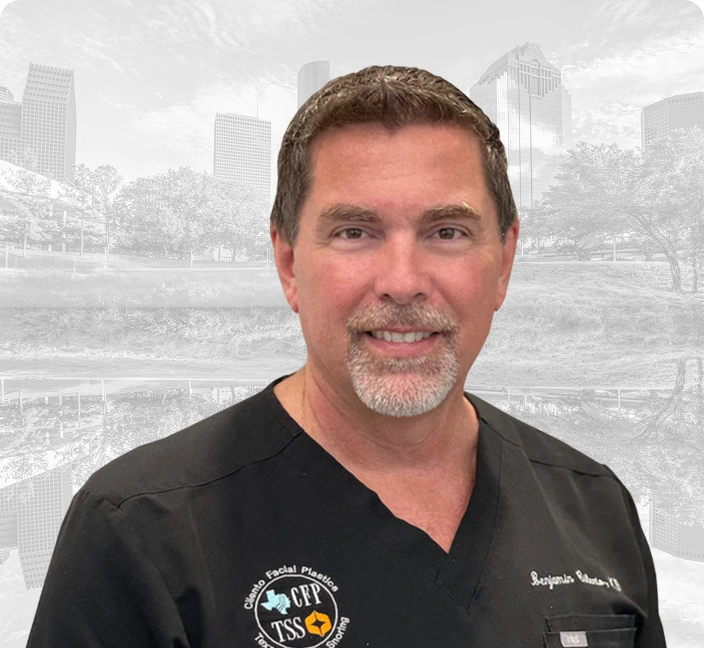Prevalence of Snoring
Snoring is a common condition that affects individuals of all ages, genders, and backgrounds. According to the National Sleep Foundation, approximately 90 million American adults snore occasionally, while nearly half of the population snores at some point during their lives. Factors such as age, nasal congestion, and anatomical abnormalities of the airway can contribute to the development or worsening of snoring.
Snoring can disrupt sleep patterns and lead to daytime fatigue, irritability, and long-term health consequences if left untreated. It’s also important to understand that snoring is a family problem. The snorers’ sleep is disrupted, but so is the sleep of the whole family.
Understanding Snoring and Its Relationship to Sleep Apnea
Snoring is a progressive weakening of the tissues of the back of the throat (palate and tongue). Essentially, it is the aging of the air passages combined with a partial or complete nasal obstruction. As we age, the palate and tongue begin to vibrate during sleep, typically occurring when airflow is partially obstructed while breathing.
Once you start snoring, you get worse faster since aging and nightly mechanical trauma combine to increase the deterioration of the tissues. Eventually, the palate and tongue block the throat during sleep, causing a drop in oxygen. This is called apnea, and more than five episodes per hour is considered sleep apnea; more than 30 episodes per hour is classified as severe sleep apnea.
In many cases, snoring is the first symptom of obstructive sleep apnea (OSA). The only way to tell for sure is with a sleep study. We all know sleep apnea is characterized by fragmented sleep and increased risks of cardiovascular complications. Snoring is a common feature of sleep apnea, but not all snorers have underlying sleep apnea. Therefore, evaluation by a healthcare provider is essential to determine whether snoring is indicative of a more significant sleep disorder.
It is absolutely vital that your provider performs a CT scan to evaluate and treat sources of nasal obstruction, such as a deviated septum, concha bullosae, and enlarged turbinates. It is also essential to perform a nasal endoscopy to determine if chronic sinusitis or allergic rhinitis is also contributing to the condition.
Remember that no matter what you choose as a cure for your snoring, it must always start with a patent nasal airway.
Remedies for Snoring
There are various over-the-counter products and remedies marketed as solutions for alleviating snoring and improving sleep quality. These include mouth tape, nasal strips, and over-the-counter mouth guards, which are designed to reposition the jaw and tongue to prevent airway obstruction during sleep.
Mouth Tape
Mouth tape is the most dubious of all the remedies since it comes from a flawed thought process. Humans are nasal breathers, and if they are mouth breathing, it is usually because they have a nasal obstruction. This requires evaluation and treatment.
If you continue to have a nasal obstruction and cover your mouth, you will likely feel suffocated. In a very small subset of people with a fixed and persistent nasal airway and mouth breathing, the mouth tape may promote better breathing mechanics.
Nasal Strips
Nasal strips help to widen nasal passages and improve airflow, potentially reducing snoring caused by nasal congestion. They may offer temporary relief for individuals with mild congestion or minor anatomical narrowing of the nasal valves.
Over-the-Counter Mouth Guards
Over-the-counter mouth guards aim to position the lower jaw forward to prevent airway collapse and reduce snoring sounds during sleep. While not custom-fitted, some users find modest improvement in snoring if their condition is related to mild jaw or tongue positioning issues.
While these remedies may provide temporary relief for mild snoring, they may not be effective for moderate to severe cases or underlying sleep apnea.
Advanced Treatment Options for Snoring and Sleep Apnea
In cases where snoring is indicative of obstructive sleep apnea or conventional remedies have been ineffective, advanced treatment options may be recommended to address the underlying airway obstruction during sleep.
Inspire Implant
The Inspire implant is a novel therapy approved by the FDA for treating moderate to severe obstructive sleep apnea. This surgically implanted device stimulates the hypoglossal nerve to control the position of the tongue, preventing airway collapse during sleep and thereby reducing snoring and improving breathing patterns.
Continuous Positive Airway Pressure (CPAP) Therapy
CPAP therapy is considered the gold standard treatment for sleep apnea and severe snoring. CPAP involves wearing a mask connected to a machine that delivers pressurized air to keep the airway open during sleep.
By maintaining consistent airflow and preventing airway collapse, CPAP therapy effectively reduces snoring and improves oxygenation, leading to better sleep quality and overall health outcomes for individuals with sleep apnea.
Palatal Implants
For patients experiencing chronic snoring due to soft palate vibration, palatal implants may offer a minimally invasive medical treatment option. Also known as the Pillar Procedure, this technique involves inserting small polyester rods into the soft palate to stiffen the tissue and reduce its tendency to collapse during sleep.
According to Harvard Health Publishing, the procedure can be effective for individuals who snore but do not have severe sleep apnea. While not as comprehensive as other surgical options, palatal implants may be recommended after a thorough diagnosis by our doctors, particularly for those who are not ideal candidates for more extensive forms of surgery. As with any treatment, careful assessment is necessary to determine whether palatal implants are an appropriate solution for managing chronic snoring.
Other Oral Appliance Therapies
Beyond CPAP and surgery, dental sleep medicine offers several alternatives that aim to treat snoring and improve breathing during sleep. Custom anti-snoring devices, such as mandibular advancement devices (MADs), work by repositioning the jaw to prevent obstruction caused by the tongue or excess tissue in the throat. These devices are fitted by medical professionals and are often used when symptoms like excessive daytime sleepiness accompany snoring.
In cases where nasal obstruction is minimal and the issue lies primarily in the mouth and throat rather than the nose, these appliances can be an effective solution. While over-the-counter options exist, professionally designed and adjusted devices offer a better fit, greater comfort, and more long-term results.
Can Lifestyle Changes Help Reduce Snoring?
While medical treatments are often necessary for persistent snoring and sleep apnea, certain lifestyle changes can significantly reduce or even stop snoring in mild cases. Simple adjustments to daily habits may improve sleep quality and lessen nighttime breathing issues.
Avoid Alcohol
Snoring occurs more frequently when the muscles in the throat relax too much during sleep—something that drinking alcohol before bedtime can cause. Alcohol reduces muscle tone in the upper airway, allowing tissues to collapse and vibrate more easily. Limiting alcohol consumption, especially in the evening, can help keep the airway open and reduce snoring.
Quit Smoking
Smoking irritates the upper airway, causing inflammation and swelling that narrows the breathing passages. This not only contributes to snoring but can also lead to waking up with a sore throat. Quitting smoking can improve airflow, reduce snoring, and enhance overall respiratory health.
Maintain a Healthy Weight
Being overweight increases the amount of tissue surrounding the throat muscles, which can contribute to airway obstruction during sleep. Maintaining a healthy weight may reduce pressure on the airway and help prevent snoring. In addition to minimizing this common problem, weight loss can also reduce risks associated with high blood pressure and other health conditions linked to poor sleep.
Change Sleeping Position
Your sleep posture plays a role in how much snoring may occur. Lying on your back allows the tongue to fall backward into the throat, partially blocking airflow. Adjusting your bedtime habits to sleep on your side can promote better breathing and reduce snoring episodes.
Other Lifestyle Changes to Stop Snoring
Some individuals may experience difficulty concentrating during the day due to poor sleep caused by snoring. Even short periods of disrupted sleep at night can take a toll on cognitive function and energy levels. Addressing allergies, establishing a consistent sleep routine, and creating a calming pre-sleep environment can help you relax and minimize snoring over time.
Conclusion
Snoring is a prevalent condition that can significantly impact sleep quality and overall well-being for individuals and their partners. While over-the-counter remedies may provide temporary relief for mild snoring, it is essential to evaluate the condition by a healthcare provider to rule out underlying sleep apnea or other serious conditions.
Advanced treatment options such as the Inspire implant and CPAP therapy offer effective solutions for addressing snoring and sleep apnea by targeting airway obstruction and promoting optimal breathing patterns during sleep.
By understanding the relationship between snoring and sleep apnea and exploring evidence-based treatments, individuals can effectively manage snoring and improve their sleep quality and overall health.




